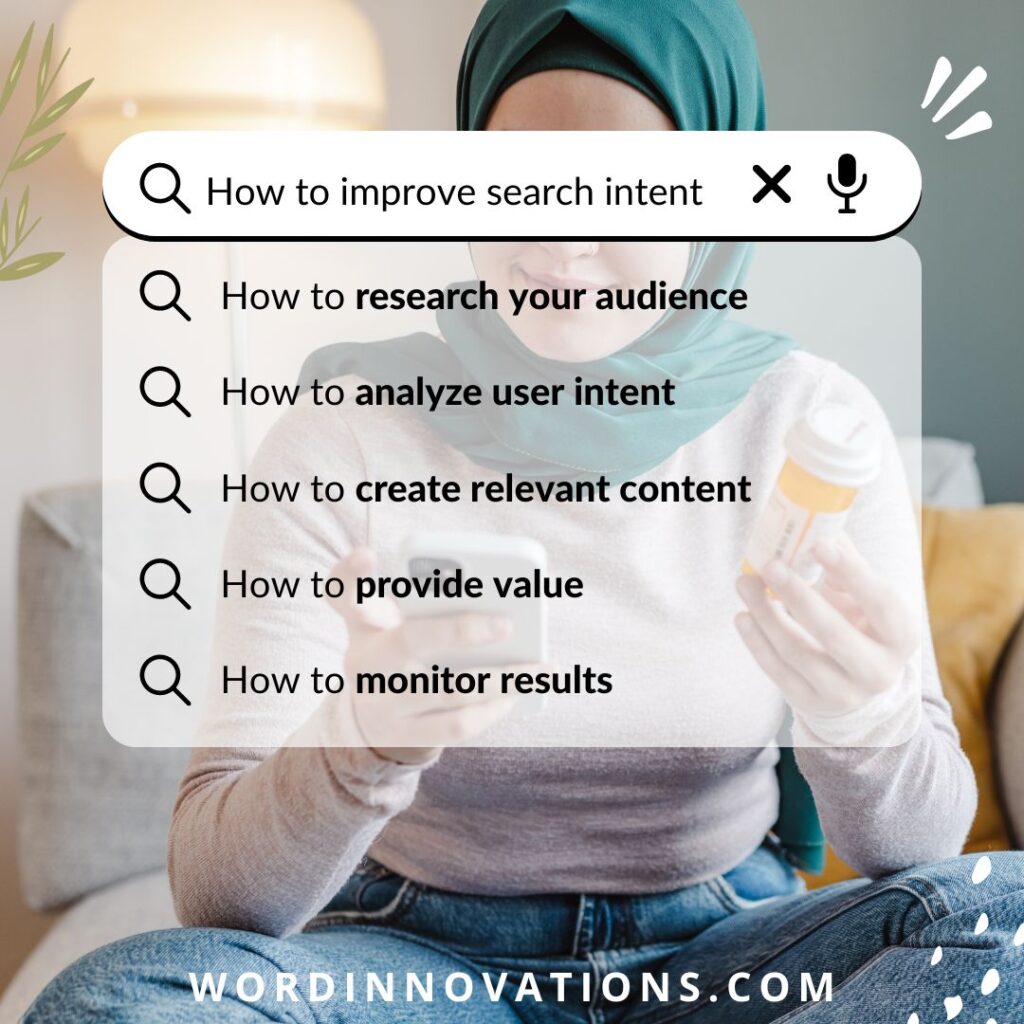Keywords must now share the sandbox with user search intention.
Are you tired of your website traffic looking more like a ghost town than a bustling metropolis? Do you constantly wonder why your visitors fail to convert, no matter how much traffic you drive to your site? Well, it’s time to talk about search intent. It’s the secret sauce many businesses overlook regarding their SEO strategy. Let me tell you–it makes all the difference. So, sit tight and get ready to discover the power of search intent!
Why Search Intent Matters So Much
Search engines have become a vital part of our daily lives. We rely on them to find everything from products to services, information, and answers to our most pressing questions. But have you ever wondered why certain websites appear first in the search results while others don’t? The answer lies in search intent, a crucial aspect of search engine optimization (SEO).
Think of it as the missing puzzle piece that turns your website into a well-oiled conversion machine. Don’t worry. I’m here to help you understand it and optimize your content to meet the needs of your target audience.
All joking aside, let’s get down to this consequential matter.
What Is Search Intent?
Search intent refers to the reason why someone conducts a particular search query. It is the underlying motive behind a search query and what the user hopes to accomplish by conducting that search. Understanding why someone is Googling is critical for creating compelling copy that resonates with your audience. For instance, if someone searches for “best copywriters near me,” they probably want to hire a local writer. However, when someone searches for “best SEO copywriting tips,” they want to know how to write marketing material.
Understanding the Four Types of Search Intent
As you’ll see, you can encounter four primary types. Further, they can overlap–say, a blogger that delivers information and sells branded promotional merchandise. The key to conversion is understanding why the user wants to interact with you. These four categories best explain it.
- Informational Intent: Users look for information on a specific topic, such as “how to lose weight” or “best time to visit Hawaii.” The purpose of these searches is to gather information.
- Navigational Intent: Users conduct these searches with the intent to navigate to a particular website or web page. For example, “Facebook login” or “YouTube homepage.”
- Commercial Intent: These searches are performed with the intent to purchase a product or service, such as “best laptops under $1000” or “cheap flights to Miami.”
- Transactional Intent: These searches have a specific transactional goal, such as “buy iPhone X” or “book a hotel in New York.”
Here is an example:
Let’s say you own a clothing store, and you’re creating a blog post about winter fashion trends. Ensure the blog post aligns with your audience’s search intent. By analyzing search intent, you might discover people searching for “winter fashion trends 2023” or “best winter outfits for women.”
Armed with this information, you can create optimized content for these specific search queries, making it more likely to show at the top of the search engine results pages (SERPs).
How Does This Differ from Keywords?
Keywords are the words or phrases that users type into search engines when conducting a search query. Search intent, on the other hand, is the motive or purpose behind the user’s query. While keywords are important for SEO, focusing solely on them can lead to content that doesn’t match the user’s search intent. It’s essential to consider keywords and search intent when optimizing your website for search engines.
Why Is Search Intent Important for SEO?
Search intent is critical for compelling content to rank well in search engines. If your content doesn’t align with what the user hopes to learn, it’s unlikely to appear at the top of the SERPs.
By understanding search intent, you can create content that addresses the user’s needs and provides value, increasing the likelihood of ranking well in search engines. Search engines like Google constantly update algorithms to provide users with relevant and helpful search results.
This statement means they prioritize content that matches the user hopes to find, not just the keywords they use. Optimizing your content for search intent makes you more likely to rank well in search engines, which can drive traffic and increase conversions.
What Are the Steps to Optimize for Search Intent?
- Research your audience: Start by researching your audience and understanding their needs and pain points. Use tools like Google Analytics and social media to gain insights into their behavior and preferences.
- Analyze use intention: Use keyword research tools like Google Keyword Planner to analyze search intent and identify your audience’s keywords and phrases to find your products or services.
- Create relevant content: Based on your research, create content that aligns with the user’s needs. Use the keywords and phrases you identified to optimize your content for search engines.
- Provide value: Ensure your content provides users value and addresses their needs. This added care can help increase engagement and drive conversions.
- Monitor and refine your search engine rankings, content, and SEO strategy. Keep up with changes in the search engine algorithms and adapt your strategy accordingly.
These steps are a critical aspect of SEO that you must pay attention to. By understanding your audience’s desire for reliable information and creating content that aligns with their needs, you can improve your search engine rankings and drive more traffic and conversions to your website. Following the steps outlined here, you can optimize your website for search intent and stay ahead of the competition in today’s digital landscape.

Is Search Intent More Important Than Keywords Today?
While keywords remain essential to SEO, search intent has become increasingly important in recent years. As search engines like Google prioritize content matching the user’s search intent, it’s crucial to consider keywords and the site visitor’s intention when creating content.
Search intent provides context for the keywords being used, helping search engines understand the user’s underlying motive and purpose for the query. Creating content that aligns with the user’s search intent makes you more likely to rank well in search engines and provide value to your audience.
Ultimately, both search intent and keywords are critical for effective SEO. By balancing both factors and optimizing your content accordingly, you can create a strong SEO strategy that drives traffic, engagement, and conversions.
Do Keywords Still Matter to Search Engines?
Keywords are still a crucial component of SEO and remain an essential ranking factor for search engines. While search engines increasingly prioritize content that matches the user’s intentions, keywords provide context to help Google or Bing understand your content.
However, it’s essential to use keywords strategically and avoid overstuffing your content with them. Search engines like Google penalize websites with excessive keyword density or black-hat SEO practices.
Instead, focus on creating high-quality content that provides value to your audience while incorporating relevant keywords and phrases. Optimizing your content for keywords can improve your search engine rankings, driving your share of traffic to your website.
Summing It Up: Search Intent Is Critical for Your Website’s SEO
Optimizing your website for search intent is crucial for effective SEO and driving traffic to your website. By understanding your audience’s search intent and creating content that aligns with their needs, you can improve your SERP rankings and provide value to your audience.
As an experienced copywriter, I can help you craft content that will resonate with your audience and spark conversions. I’ll also assist with reworking old content–the oldie-but-goodies that once converted but fizzled more recently. Connect with Word Innovations today if you need powerful, engaging copywriting, video scripts, or articles for your blog.
.